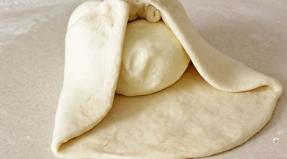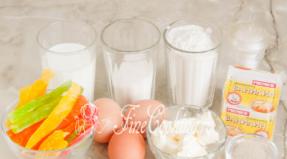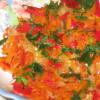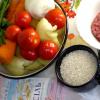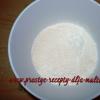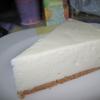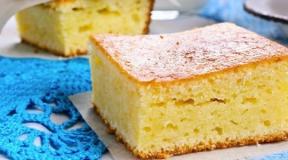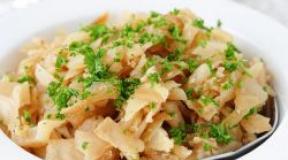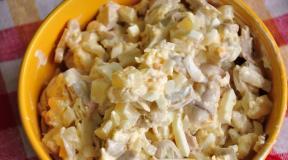Edible coconut oil for food. The miraculous properties of coconut oil
Coconut oil as a food product causes a lot of controversy both among ordinary people and among nutritionists. The product is based on coconut pulp, which can be fresh or dried (called copra).
Composition
Most of the composition (about 99%) is fatty acids. Among them are polyunsaturated fatty acids (these are well-known Omega-3, -6), monounsaturated (nervous, oleic, palmitoleic acids) and saturated fatty acids (butyric, stearic, caproic and others). In a small amount, the product contains tocopherol (vitamin E), phytosterols, as well as zinc, calcium, phosphorus. The minimum amount (about 1%) contains water.
The energy value of the product is quite high - 900 kcal / 100 g. However, in such an amount, the product, of course, is not eaten at a time, so such a high calorie content does not seem so terrible. A tablespoon contains about 130 kcal. The basis of the BJU-composition is fats (99.9%), proteins and carbohydrates are absent.


How is it useful?
Coconut oil is characterized by the fact that when heated it does not emit a carcinogen and almost does not change its composition. This allows it to be used for frying. Possessing enveloping properties, the product improves the condition of the gastric mucosa, eliminates minor inflammation. It is useful to serve spicy, spicy food with it, as it will neutralize the aggressive influence of spicy foods. In addition, coconut oil is antiseptic and helps to improve the absorption of nutrients from food.
The beneficial effect of the product is also found on the liver - the organ's ability to cleanse itself, the level of bile produced, increases. Despite the abundance of fatty acids, coconut product does not cause an increase in cholesterol levels; on the contrary, it strengthens the cardiovascular system, reducing the risk of heart attack and atherosclerosis. When consumed in moderation, it helps reduce high blood pressure.
Fatty acids are essential for proper metabolic processes. From the stomach, these components travel directly to the liver, where they are broken down and converted into ketane bodies. The latter are important for the normal functioning of the central nervous system, especially the brain. In addition, according to studies, ketane bodies are able to block hunger and increase energy expenditure by 3 times during metabolic processes. In other words, with the right approach to consumption and nutrition in general, coconut oil, despite its high calorie content, can be used for weight loss.


More than half of the composition of the product is "given" to lauric acid. When cleaved, it is transformed into monolaurin (a similar compound is present in breast milk), which has pronounced antiviral and antifungal properties. In this regard, it can be argued that regular use of coconut oil can increase the body's resistance to viral infections, including colds, ARVI.
Lauric acid also increases the "good" cholesterol in the blood and reduces the level of "bad". Monolaurin in combination with caprylic acid suppresses candidal fungi (namely, their a large number of in the intestine explains the constant desire of a person to eat sweets) and supports the beneficial intestinal microflora, improves digestion. And in combination with vitamin D, this same monolaurin strengthens tooth enamel.
Fatty acids allow better absorption of calcium, magnesium and a number of other microelements, so it is useful to combine it with vegetables and fruits, meat, fish. In addition, fatty acids themselves are essential for the structure of the skeletal system.
The product is especially useful for women, since the combination of tocopherol and fatty acids is necessary for the functioning of the reproductive system. Its components contribute to the production of female hormones, stabilize the hormonal background. Lack of fats and vitamin E in the body turns into such unpleasant external changes as dry skin, brittle nails and hair, dull complexion. Vitamin E has a powerful antioxidant effect, removing toxins from the body and reducing the intensity of age-related cell changes.



Contraindications
The high calorie content of coconut oil makes it unsuitable for people with obesity, overweight. In case of pancreatitis, the product should be used with caution, it is better to first consult a doctor, since an exacerbation of the disease is possible.
Individual intolerance to the product, irritation of the gastric mucosa and cholecystitis - all this is a contraindication to the use of coconut oil. It is fair to say that the product is considered hypoallergenic, but if you are allergic to nuts, most likely, the oil will not be accepted by the body.
Excessive use of the product, of course, will only bring harm. It can provoke nausea, abdominal pain, and stool disorders. The permissible daily dosage for an adult, provided that there are no contraindications, is 3 tablespoons, for elderly people it is reduced to 1 tablespoon, for children - to a teaspoon.

What kind of oil can you eat?
Coconut oil can be prepared by one of three methods - cold-pressed, hot-pressed, and frying. It is recommended to use a cold-pressed product for food, which is pressed in a centrifuge without the use of high-temperature exposure. Oil produced in this way can be identified by the Virgin and Extra Virgin labels on the packaging.
Such a product contains no carcinogens and harmful compounds, and contains nutrients in maximum concentration. Naturalness is also indicated by the coconut aftertaste and aroma inherent in the oil. Unsurprisingly, cold-pressed oil has the highest cost.
It is better not to eat the hot-pressed product, but to use it for cosmetic purposes.This oil is made from dried coconut pulp, which is pressed in a centrifuge under a hot press. In this regard, some of the useful elements are destroyed, and some of them turn into carcinogenic compounds. In terms of its taste, such a product is significantly inferior to the analogue of cold pressing, it does not have a pleasant coconut aroma.


The oil obtained by frying should not be consumed not only for food, but also for cosmetic purposes. The technology of its production involves drying the pulp and then frying it, during which oil is released. Such an aggressive thermal effect does not allow useful elements to remain in the oil. As a rule, such a product has a low price. In Russia, Thailand is usually the supplier of such oil.
The next indicator of the usefulness of the oil is the degree of its purification. Refined (refined) and unrefined (unrefined) oils are distinguished here. During cleansing, the oil loses most of its beneficial components, in addition, after cleaning it is often deodorized (that is, bleached) by adding "chemistry". Turns out that only cold-pressed unrefined coconut oil is beneficial.
However, the word "refined" does not mean that the oil is not suitable for use, it just will bring less benefit. There is also a “highly refined” product, which means that lauric acid has been removed from it during the refining process. Such oil can both be eaten and used for cosmetic purposes.
But the purchase of a product with the inscription "fractional extract" should be abandoned, since its composition is represented exclusively by fatty acids. This oil is approved for use in perfumery and soap making.

Cooking recipes
Coconut oil can be consumed in two ways - pure and added to various dishes. In the first case, the oil is used to treat certain diseases, weight loss. Take it 1-2 tablespoons on an empty stomach half an hour before breakfast, washed down with warm water. You should start taking with half a teaspoon, gradually increasing the dosage.
Most note that such a procedure is unpleasant, and the specific taste of the oil on an empty stomach causes nausea. It is much more pleasant to use it in combination with the usual dishes. In cooking, oil is used for frying various dishes, dressing salads and cereals, put in dough (shortbread dough with coconut product becomes juicier, and biscuit dough becomes softer), sauces are prepared. Here are the most interesting recipes using coconut oil.

Salads
It is most logical to season salads with coconut oil. However, one should remember about its peculiarity - to freeze at a temperature of + 22.25 ° C, therefore, the dressing should not be cold.
- Prepare a salad of one cucumber and a couple of tomatoes, add onion cut into avocado pieces and half rings, add a little cheese. Heat 2 tablespoons of coconut oil, pour in a teaspoon of freshly squeezed lemon juice and season the salad.
- The option for a more satisfying salad involves a combination of lettuce leaves, boiled seafood (you can take canned ones), and Cherry tomatoes. To this should be added the olives cut into circles and onion rings. Season with a mixture of honey, lemon (one teaspoon each) and melted coconut oil.
- The oil, sweet with coconut aroma, goes well with fruit salads. To prepare one of them, mix the sliced \u200b\u200borange, apple, kiwi, pear and banana. Make the dressing from coconut oil and honey. Decorate with pomegranate seeds or a mint leaf.

Soups
Coconut oil will accentuate the flavor of spicy thick soups, which is why professional chefs love to put the product in mashed soups. Here is a recipe for a fragrant autumn soup that delights with its noble appearance and incredible taste. Pumpkin puree soup is made with the following ingredients:
- 1 kg of pumpkin pulp;
- 2 tablespoons of coconut oil
- 1 liter of chicken broth;
- 1 tablespoon each curry and cane sugar;
- a teaspoon of ground ginger;
- 3-4 cloves of garlic;
- ground cayenne pepper, salt, herbs - to taste.
Melt the coconut oil in a soup pot and heat it, then add the diced pumpkin pulp and fry it for 6-8 minutes. Add the cane sugar, ginger, curry and cayenne pepper and simmer for a couple of minutes. Pour in chicken broth, chopped garlic and cook the soup for 50 minutes. Add salt, beat the pumpkin pulp with a blender. Heat the soup a little more over the fire and serve, garnish with herbs.
During the final heating, you can pour in 20 ml of cream for a more delicate taste.

Side dishes
You can fill any porridge with coconut oil, and when cooking mashed potatoes, replace butter with it. Since the coconut product does not emit carcinogens when heated, you can fry potatoes and pasta on it. Here's a recipe for making friable rice, which is a versatile side dish. Coconut Oil Loose Rice can be made by taking:
- 3 tablespoons of coconut oil
- 200 g of rice;
- 400 ml of water;
- 1 teaspoon each of cardamom, turmeric and coumarin;
- salt to taste.
Rice must be taken long-grain, transparent or glassy. Suitable for pilaf ("Devzira", "Basmati", "Jasmine"), as well as steamed groats. Rice should be thoroughly washed beforehand, and then soaked in cool water for 2-3 hours. Steamed cereals should not be soaked, washed well enough. In a thick-walled saucepan or cauldron, melt and warm up the oil, put the rice prepared in advance. Add spices and salt, pour in water.
First, make the fire strong, but as soon as the water in the dish begins to boil, reduce the flame to a minimum and simmer the rice for 30-40 minutes until cooked under the lid. Cover the finished rice with a lid and a warm towel on top. Let stand for a quarter of an hour, then serve.

Pastries and drinks
Coconut oil can be substituted for butter or margarine in baked goods. In the article, we will focus on the original recipe for banana pancakes. Ingredients:
- 1 ripe large banana;
- 200 ml of milk;
- 100-150 g of flour (how much the dough will take);
- 2 tablespoons of coconut oil
- a teaspoon of ground cinnamon.
Break the banana into pieces, add milk and use a blender to turn into a homogeneous gruel. Pour in melted coconut oil, add cinnamon and then flour. You should get a pancake dough of usual consistency. A little sugar can be added if desired, but the sweetness of the banana and butter should be sufficient. Fry the pancakes in a hot skillet on both sides. Oil will help to add coconut notes to the usual tea or coffee. The drink will turn out to be "winter", warming. Do not forget that its calorie content will increase noticeably.
Familiar cocoa can be turned into a more delicious and original drink. To do this, heat a glass of milk, add 2 teaspoons of cocoa powder, a teaspoon of coconut oil, add sugar to taste, a little vanilla and coconut. Warm up the mass, but do not let it boil. Remove from heat and serve.


How to choose and store?
As already mentioned, only cold-pressed oil can be beneficial to the body, which can be recognized by the inscription on the Virgin or Extra Virgin packaging. If the manufacturer indicates Coconut Oil, it means that the oil from the coconut pulp was extracted using chemical solvents. It is hardly possible to call it useful and safe for health. Although a number of confectionery products contain such a product.
When choosing a product, you should pay attention to its color and consistency. It should be transparent or white, homogeneous in structure, thick, but not sticky.But the presence of yellowness, golden sediment indicates a low quality of the product.
Good coconut oil has a delicate taste, it melts in your mouth and has a slight nutty aftertaste. This oil also has a pleasant sweetish coconut smell.

The product should contain only coconut pulp. If you find thickeners, preservatives, dyes in the list of ingredients, it is better to refuse to buy. Finally, it should be understood that quality cold-pressed coconut oil cannot be cheap. Firstly, this is due to the large amount of raw materials (when cold pressed from 1 kg of coconut pulp, a little more than 100 ml of oil is obtained, while during hot processing - about 300 ml), and secondly, the greater benefit that Extra Virgin oil has ...
In a factory sealed container, oil is stored for 2-4 years. Preference should be given to the product in a glass tinted bottle. It is important to protect the oil from light and sunlight. The optimum temperature is no more than + 18 ° C, the humidity level is no higher than 60%. It is forbidden to freeze the oil. After opening the package, keep the oil in the refrigerator (ideally in a special compartment in the door).

According to reviews, the best coconut oil comes from India. Thailand produces a lot of fakes, as well as oil obtained by frying. Butter, as already mentioned, can be used for baking. In addition, in the oil itself, you can fry the same pies, cheese cakes, pancakes. At the same time, an oily taste will not be felt in the finished dish, but they will clearly feel delicate coconut notes in taste and aroma. It is good to cook with coconut oil and popcorn, which gives it a pleasant nutty aftertaste.
For sugary foods and drinks, it's best to choose unrefined coconut oil, which will give them a pleasant coconut flavor. In meat and fish dishes, in unsweetened side dishes, such a smell may be superfluous, so preference should be given to a refined analogue.
If you are prone to blood clots, then it is recommended to combine coconut oil with olive or peanut oil. An important point - they must both be cold pressed.
For more information on how to use coconut oil, see the next video.
The chemical composition of coconut oil has a high concentration of saturated fatty acids - 96%. Compared to other oils, this is the largest indicator, for example, butter - 66%, pork fat - 34%, olive oil - 14%.
99.9% of the nutritional value is represented by fats, carbohydrates and proteins are absent. There are vitamins PP, A, B, C, E, elements of phosphorus and potassium. Fats are 45% lauric acid, and there are also other useful acids: 15% - myristic, 8% - palmitic, 5% - oleic, 4% - caprylic, etc.
How coconut oil affects the body
The health benefits of coconut oil make it a powerful antioxidant. Regular use strengthens the immune system, lowers cholesterol, sugar, normalizes blood pressure, has a beneficial effect on the state of the nervous system, prevents the development of diseases of the cardiovascular system, helps to cope with viral infections. Strengthens the gums, improves the functioning of the digestive tract, has a positive effect on the state of the mucous membrane, the functionality of the thyroid gland, stabilizes the hormonal background, slows down the aging process.
Coconut oil has been shown to inhibit the progression of cancer cells and cleanse blood vessels. It also has a positive effect on the female body (hypoglycemia, ovarian dysfunction). Prevents atherosclerosis, heart attack, stroke, kidney, liver, bladder diseases. Improves the condition of the skin, nails and hair.
Coconut oil contributes to weight loss, since the product is quickly excreted from the body, and does not form fatty deposits, accelerates metabolic processes. It is important to know that untreated coconut oil has a beneficial effect.
Recent research refutes popular belief that coconut oil is harmful, as not all saturated fat is harmful. Lauric acid (saturated fat) takes about 50% of the fat equivalent, but this substance has a beneficial effect on humans and equates to the level of Omega-3. Lauric acid has antiviral, antifungal and antibacterial effects, and is considered curative for people suffering from heart problems.
How to choose the right one
Coconut oil is marketed in two forms: edible oil for culinary purposes and non-edible oil for cosmetic purposes. Sold in liquid and lumpy forms. A quality product is usually packaged in metal, ceramic or glass containers. The composition should not contain products of animal origin. If the smell has shades of chemistry or rancidity, then it is better to refuse such a product. The best choice would be butter that is not deodorized, bleached, or fermented. It is not recommended to buy from online stores. Quality is always guaranteed in specialized stores and pharmacies.
Storage methods
Coconut oil does not require low temperatures during storage. In a warm room, it does not lose useful properties throughout the year. To do this, you need to keep the product in a place protected from light and in a hermetically sealed container.
It is useful to know that at temperatures below +25 o, the oil acquires a creamy state or completely hardens, this does not affect the quality. To obtain a liquid consistency, it is enough to heat the product in a pore bath.
Cooking applications
Coconut oil has a wide range of uses, similar to margarine and butter. It is used to create sauces, soups, hot snacks, vegetable, fish and meat dishes, milk porridges, side dishes, confectionery. Coconut oil buns and tarts are fluffy and last longer. Ideal for deep-frying, if desired, added to hot drinks: milk, coffee, sandwiches and pie fillings are made with it.
Coconut oil goes well with rice, potatoes, pasta, buckwheat. A particularly valuable quality that more than one oil does not have is its resistance to high temperatures - it can be used for frying up to 5-6 times, the chemical composition remains unchanged, carcinogens are not formed.
Healthy food combination
Various studies have shown that coconut oil is completely absorbed and does not form fatty tissue in the body. Moreover, it helps to lose weight and normalize weight. Combined with proper nutrition, it reduces the negative effects of carbohydrates.
Nutritionists recommend using coconut oil with vegetables. Combine in dishes with eggplant, cabbage, carrots, zucchini, beets, pumpkin. It is useful to add small quantities to cereals: oatmeal, rice, millet, buckwheat, pumpkin, wheat.
Popular diet for weight loss on vegetables and coconut oil, the use of which can increase metabolism. It is also useful to add to salads with fresh vegetables. Supporters of oriental healing methods use coconut oil successfully. In Ayurveda, coconut oil is considered a panacea for overweight people, the easiest way to lose weight is to consume 1 tbsp. l. on an empty stomach instead of breakfast.
There are special coconut diets in which you need to not exceed 1100 kcal in the daily diet and adhere to a certain diet. For a week, 1.5-2 kg are steadily gone. There is an effective way to lose weight with coconut oil - daily use three times a day 20 minutes before meals 1 tbsp. l. oil diluted in a glass of warm water. To cleanse the intestines, take oil 30 minutes before breakfast: 2 tbsp. l. oil, dissolved in 100 g of warm water, and then drink 1 glass of hot water.
When calculating calories, it is important to know:
- In 1 tsp. 5 g, which is 45 kcal
- In 1 st. l. - 17 g \u003d 153 kcal
- In 1 glass - 230 g \u003d 2068 kcal.
Contraindications
With moderate use, it has no contraindications. Sometimes it can cause allergic reactions. In limited quantities with increased thyroid activity.
Application in medicine and cosmetology
In folk medicine, coconut oil is used to treat inflammation of the prostate gland, psoriasis, and dermatitis. Effective for menstrual irregularities, viral infections, hepatitis, liver diseases. Used for HIV and cytomegalovirus. And also to improve immunity, normalize blood pressure, cholesterol and blood sugar levels. It is prescribed for indigestion, to improve metabolism.
Outwardly, coconut oil is used for skin lesions in the form of cuts, wounds, scratches, and helps to get rid of bruises.
In cosmetology, coconut oil is included in massage mixtures, emulsions and tanning creams, in various body, hair and face care products, and is included in anti-cellulite programs. All types of cosmetic products with coconut oil soften, moisturize, have a rejuvenating effect, and improve the structure of the skin. The hair is especially beneficial: they restore the scalp, strengthen the roots, and eliminate dandruff.
A popular recipe for increasing skin elasticity: 3 tbsp. l. coconut oil, 1 tbsp. l. oat flakes, 5 drops of orange oil. It is applied with massage movements all over the body, except for the face. After 10 minutes, it is washed off with soap or shower gel.
Natural coconut oil is made from the dried pulp of a palm tree (copra). The product exhibits a moisturizing, emollient, anti-inflammatory and antimicrobial effect on hair, skin and the whole body, which is why it is highly valued by nutritionists and cosmetologists. Its regular use will keep you young.
Why is coconut oil useful?
Like most vegetable oils, coconut is pressed in two ways: cold and hot. With the first option, all the beneficial substances are preserved, but the use of the method is an expensive pleasure, since very little vegetable pomace (10%) is obtained, which is available in the pulp of coconut. During hot pressing, the product partially loses the necessary components, so it is much cheaper than the first one.
The benefits of coconut oil are due to its unique composition. The product contains polyunsaturated fatty acids necessary for humans. The body does not synthesize substances, and they can only be obtained from the outside. Fatty Acids of Coconut Oil:
- capric;
- caprylic;
- stearic;
- arachidonic;
- linoleic;
- palmitic;
- oleic;
- lauric;
- myristic.
Fatty acids and metabolites help a person fight numerous pathogens, and therefore prevent the development of various infectious diseases. The richest composition of a natural product boasts a high content of phosphorus, calcium, vitamins, C, A, E, which are the main substances that allow you to maintain beauty and prolong youth.
For hair
Coconut plant extract is a godsend for any hair. This natural product is effective against baldness, tangled ends and split ends. With regular use, the product will relieve the scalp from itching and redness, and remove dandruff. Applying the coconut oil hair mask on a regular basis will minimize protein loss. No other natural product has shown such remarkable results in maintaining the protein and natural pH balance of the skin. How to make a hair mask:
- mix a spoonful (tablespoon) of warmed vegetable fat with a teaspoon of honey;
- with clean fingertips, apply the mixture to the scalp and along the entire length of the strands;
- leave the mask on for 20-40 minutes, then wash off with shampoo and conditioner;
- if possible, let your hair dry on its own;
- repeat the procedure a couple of times a week.
For face
The coconut pulp product has been successfully used on the face. The product is well tolerated by any type of skin, is easily absorbed, and goes well with other cosmetic products (lotions, gels, creams). Coconut oil is especially popular for wrinkles, as it stabilizes the production of sebum, rejuvenates and smoothes the surface of the skin. The plant extract is widely used for oily skin, as it quickly removes acne and pimples. The properties of a natural antiseptic actively resist bacteria.
For Tan
The squeeze of dry coconut pulp on the epidermis provides an antibacterial effect, and the hyaluronic acid contained in the product creates a moist environment on the skin surface, normalizing the water balance on the body, face and lips. Due to these properties, unrefined plant extract is widely used for protection against UV rays. Use coconut oil for tanning while visiting the beach or solarium to get an even skin tone without damaging the health of the epidermis. When applied during sunbathing, the product shows its best properties:
- protects against ultraviolet radiation;
- prevents redness of the skin;
- regulates water balance, deeply penetrating cells;
- softens horniness;
- slows down the aging of cells, activates their regeneration.

For body
Coconut pulp extract is widely used in cosmetology and medicine for the treatment of skin. Correct application of the unrefined product will give a good opportunity to have velvety skin at any time of the year. How to use coconut oil for an attractive body:
- after each visit to the sauna, steam bath, hot bath or shower, rub your skin from head to toe;
- if every evening you smear a plant extract on the décolleté area, then the appearance of wrinkles in this area is not threatened;
- massage the product into the feet, put on socks and leave overnight;
- completely replaces the cream with unrefined coconut oil for the skin of the hands, which not only moisturizes the hands, but also strengthens the nails.
For stretch marks
Due to its many beneficial properties, the use of coconut oil for stretch marks finds its application in cosmetology. Specialists rub the body with it and give it an anti-cellulite massage. According to many women, this method not only effectively eliminates cellulite, but also helps stretch marks to be less noticeable. The effect on the chest is especially visible, where striae were formed after childbirth or sudden weight loss.
How to apply coconut oil to remove stretch marks? The product should be melted in a water bath, then rubbed into problem areas. If the skin is thin and dry, then you need to massage daily for 10 minutes. For the best effect, coconut pomace can be mixed with other vegetable fat (olive, flaxseed, cocoa) and with essential elixirs (citrus fruits, rosemary, lavender).
From sunburn
After an unsuccessful tan, the use of coconut pulp extract will quickly get rid of burns. When applied to the affected area, the product forms a layer that protects against viruses, bacteria, fungi, external dust. Applying coconut oil against sunburns, you relieve the skin from decay processes, reliably protect against infection. The natural product produces a local anesthetic effect.

During pregnancy
The hair of many pregnant women becomes brittle, prone to shedding, and the skin becomes dry, on which stretch marks appear. The beneficial properties of coconut oil will help solve all these problems if the expectant mother is not allergic to its components or other contraindications for such procedures. Although coconut pomace has almost no side effects, it is best to consult your doctor before using. It is better not to use coconut oil in its pure form during pregnancy, but it is advisable to mix it with other cosmetics.
Slimming coconut oil
The process of burning fat when ingested coconut pomace is provided due to the high content of fatty acids. The tool helps to lower cholesterol levels, improve digestive processes, and speed up metabolism. Fragrant vegetable fat is completely absorbed by the body, and the calorie content is 899 kcal / 100 grams. There are two options for how to use coconut oil for weight loss:
- daily instead of breakfast, 1 spoon (tablespoon) should be taken orally;
- or before meals for 20 minutes 3 times / day, use 1 spoon (tablespoon).

For food
For the human body, food must contain three nutrients: fats, proteins, carbohydrates. The last two are easy to replenish with vegetables, fruits, dairy products, meat. Quality fats are difficult to obtain, so nutritionists recommend consuming coconut oil. This aromatic ingredient does not lend itself to high-temperature exposure, so it does not lose its properties. Use natural vegetable fat instead of margarine and you will see a positive effect in two weeks. So, Coconut Oil - Food Uses:
- include in sweet baked goods;
- use for extinguishing;
- mix with vegetable puree;
- add to rice and cereals;
- spread on bread;
- add to salads.
Coconut oil for massage
Massage therapists love natural vegetable coconut oil because it moisturizes the skin like no other. The product, having a medium absorbency, is suitable for working with deep layers of the epidermis. When it comes to the smell of coconut, people have mixed impressions of it. Someone does not hear him at all, but someone smells too much. The more the product is cleaned, the less odor will be released. When coconut oil is used for massage, the skin becomes perfectly soft and smooth. The natural product protects it from premature aging, relieves acne.

For eyelashes
Many women face the problem of excessive eyelash loss. This happens from the use of low-quality cosmetics, prolonged exposure to the radioactive sun or after stress. With regular use of coconut oil for eyelashes, they become fuller, longer and thicker. The product enhances the growth of hairs, strengthens them, restoring their former beauty. Regular eyelash care will help a woman look great even without mascara.
It is necessary to apply the product 2-3 times a week with a brush, having previously cleaned from paint residues. If mascara accidentally gets into the eyes, inflammation can begin. If the brush is not available, then it can be replaced with a cotton swab. When applying vegetable fat, one should strive to ensure that it gets to the roots minimally, otherwise a thin film forms on the mucous membrane, clouding the eyes. You need to keep the product for 2-3 hours, then rinse.
Video
Today I will talk about which coconut oil I buy, why I choose both refined and unrefined, and how I use it.
Of course, for many, coconut oil is primarily a product for skin and hair care, that is, more cosmetic, and I also use it for cosmetic purposes, I even wrote about it four years ago - when I just started blogging (this ). But after 5 years of active use, I am still more inclined to believe that coconut oil is primarily a food, since this is how it gives the greatest benefit. For the skin / hair it is also great, and in mixtures it gives a good effect, but by itself it is slightly weaker than other oils.
How is it useful in food?
This oil contains a large amount of fatty acids with a medium carbon chain length (in ordinary oils these chains are long), they are easily broken down and absorbed, improve digestion and liver function, promote weight loss (they are not put aside, but give energy). One of the most important components in coconut oil is lauric acid, it has a strong antiviral and antibacterial activity, therefore it helps to increase immunity, protects the body from various infections and diseases (by the way, breast milk contains the same acid, it helps to protect the child's body from diseases ). Due to its antiviral and antifungal activity, it is useful to eat it as a prophylaxis for herpes and thrush. Myristic fatty acid is also very useful for us, which is here, it enhances the production of elastin and collagen, which are responsible for the elasticity and youth of the skin.
Briefly about when it is recommended to take coconut oil inside (WARNING! Not for treatment, but for general benefit and prevention, to enrich food !!!): for psoriasis, for strengthening the immune system, for flu and colds, to lower cholesterol levels, to reduce the risk of cardiovascular diseases, to normalize blood pressure, to reduce weight, to speed up metabolism, to improve the absorption of nutrients, such as calcium ; and much more.
Coconut oil does not go rancid and is stored outside refrigerator much longer than other oils (and even in the heat!) - the special composition and the presence of natural antioxidants help to maintain its freshness and without preservatives.
How does it happen?
~ cosmetic - most often it is either not very well cleaned or with certain additives that prevent it from thickening in the cold, such oil is not suitable for food!
~ food - here it can be used for food and for cosmetic purposes, plus there are now many organic options here, which gives a guarantee of benefits and safety. Among food items, I buy refined and unrefined, each has its own advantages:
- refined does not smell anything, and is practically not suitable for cosmetic purposes, but it is best suited for frying, and absolutely everything - both vegetables and meat, and anything else. I rarely fry, but if I do it, then ONLY in coconut oil. Why? Because it is ONE OF THE FEW oils that does not change its properties at high temperatures and does not form carcinogens.
- unrefined - oh, this is a heavenly paradise, it smells divinely of butter nuts, yet coconut is naturally given a magnificent aroma, and it is not lost when cold pressed. This oil is also suitable for frying, but due to the fact that it smells so delicious, you cannot fry meat and onions on it, but pancakes and cheese cakes are great.
~ I add a spoon to oatmeal for breakfast - it gives creaminess and tenderness, plus increases the beneficial and nutritious properties;
~ I add a spoon or two to fruit and vegetable smoothies - the blender mixes it so that it is invisible among fruits and vegetables, but the smoothie becomes even tastier;
~ I add to baked goods, having previously melted to a liquid state;
~ I smear on everything that is possible, in a sense it replaces butter - it is just like it outwardly, only more tender, aromatic and many times more useful;
~ one of the very useful ways of using it, which for me personally is one of the most working: when feeling hungry or craving for something tasty, I eat one teaspoon of unrefined coconut oil, it gives a feeling of satiety and completely discourages the craving for "grub", thereby contributing to weight loss (plus add here the fact that coconut improves metabolism and goes into energy, and is not deposited - in this regard, it is a godsend!).
That is, from all of the above, you probably realized that I don't have a single day when I haven't eaten at least a spoonful of coconut oil, which is why you see it so often in Sunday shopping posts - I often run out of it :). Here are some of the types of oils I buy:
.
.
1. Nature's Way Organic Coconut Oil (unrefined)
I was one of the first to buy this oil and subsequently bought it several times, its quality is excellent - extra-class, cold pressed, obtained without any solvents, there are no additives in it. It is unrefined, it smells incredible - bright, very rich, but tender coconut-like, pastries and pancakes made on it become masterpieces, not otherwise (even if they look ugly :). One of the best oils I recommend.
Where to buy and price:
on iHerb here - Nature "s Way Organic Coconut Oil
($ 12.49 / 454 g).
.
.
.
2. Jarrow Formulas Organic Refined Coconut Oil
And this is refined, as I wrote above, I use it only for frying, it has neither taste nor aroma. The quality is perfect - no foreign odors, no unnecessary additives - it is obtained by screw pressing without the use of solvents, only pure oil. You can fry absolutely everything, there are no restrictions, it is not felt at all in the products. If we compare it with the same sunflower oil, then it is more economical, since it needs less (or I'm so used to using vegetable oils literally in drops, even when frying ...).
Where to buy and price: on iHerb here - Jarrow Formulas Organic Coconut Oil ($ 7.84 / 454 g).
Here it is frozen - in a cold room the coconut oil hardens and turns white, in a warm room it becomes liquid and transparent:
.
.
.
.
3. Jarrow Formulas Organic Unrefined Coconut Oil
(pictured in the middle)
Extra virgin oil, no additives, solvents or fragrances. The quality is very good - aromatic, rich, gives the dishes its own unique aroma. But if to compare, I like Nature's Way oil a little more among unrefined oils, it is even more aromatic, although this is wonderful, plus it is a little cheaper.
Where to buy and price:
on iHerb here - Jarrow Formulas Organic Extra Virgin Coconut Oil
($ 11.20 / 454 g).
.
.
.
4. Nutiva Organic Refined Coconut Oil
This oil is also refined, but it still has a light, light aroma and smack of butter, which, however, does not spoil the taste of dishes, even onions or something similar. It is obtained by cold pressing without the use of chemical solvents, steam is used for purification - there is also no chemistry here.
In general, I like it more than other unrefined ones, so, perhaps, I will continue to buy it for cooking.
Where to buy and price: on iHerb here
- Nutiva Organic Coconut Oil Refined
($ 7.52 / 444 ml).
.
.
.
5. Nutiva Organic Coconut Manna
And this is not really butter! This is a delicious, delicious thing, the so-called "manna" or mashed potatoes, here the butter is mixed with the pulp of coconut, which is ground into flour, as a result, there are no creaking coconut flakes, but in consistency it really looks like mashed potatoes. The taste is slightly sweet (there are no additives, except for the coconut itself, but the sweetness here is natural, barely perceptible), rich coconut-nutty, with creaminess and indescribable, heavenly tenderness in taste, in my opinion, this product has absorbed all the beautiful what a coconut can give in terms of taste and aroma. Due to the fact that there is also pulp, and not just oil, this product is not as fatty as pure oil, so eating it without anything is the greatest pleasure (I do not use it in cooking). And spread on a cookie !!! You can go crazy with happiness, the flavor combination is magical :). In general, every morning I start with this "manna" - I add either to oatmeal, or smear on something, or just eat a spoon, enjoying the taste and getting a charge of positive, solar coconut energy.
I love this product and would highly recommend it to all coconut lovers. Although there is one drawback - it ends quickly enough, faster than butter :(.
Where to buy and price: on iHerb here -
The unique properties of coconut oil have been appreciated since the days of Cleopatra. It was considered a sure way to preserve female beauty and youth. Due to its composition, coconut oil has been used as a nourishing and rejuvenating agent for the skin. Today, this valuable product has proven itself in cosmetology, folk medicine and the food industry.
It's no secret that coconut oil is made from coconut pulp, which contains up to 65% of it. The process of obtaining it is quite simple: first, the pulp is separated from the shell, after which it is dried and by pressing, a valuable oil is obtained, which can be refined and unrefined. As a rule, refined coconut oil is used for skin and hair care. The use of such oil has no contraindications, it is hypoallergenic, it is perfectly stored for several years even without a refrigerator and retains its qualities even with repeated heating.
Useful properties and uses of coconut oil.
Coconut oil has a wide range of health benefits. It is easily digestible, does not contain cholesterol, and provides the body with many nutrients. It contains a huge amount of valuable oils, among which oleic, lauric, palmitic, kapra, caprylic, arachidonic and others can be distinguished. In addition, it is rich in vitamins (C, A, E), natural antioxidants, and also includes a natural moisturizer - hyaluronic acid. Due to its composition and delicate pleasant aroma, it is actively used in cosmetology as additives in cosmetics (lipstick, shampoos and other hair care products, natural creams, eye makeup removers, etc.) and as an independent facilities. Such cosmetics cleanses the skin of dead cells, stimulates the metabolic processes in the skin, tones and nourishes it, making it soft, elastic, elastic and velvety. The light oil composition ensures fast absorption by the skin and does not clog pores. The use of products with coconut oil is suitable for any type of skin, helps to smooth wrinkles, eliminate acne, as well as minor damage and skin imperfections. In addition, due to its cleansing and foaming properties, coconut oil is used in the production of natural soaps.
Coconut oil is ideal for the delicate skin of babies and children. It also effectively helps with cracked heels and hands, heals eczema, wounds and burns.
Coconut oil is great for dry, sensitive, irritated skin with signs of flaking. It perfectly softens and moisturizes it and creates a kind of film that protects the skin from the negative effects of environmental factors. This is why it is added to sunscreens and after-sun products, as they protect against UV rays and soothe skin after sunbathing.
Such oil cannot be used in its pure form. The only exception is hair care. Coconut oil should be added to products for the face no more than 10%, for the body - 30%.
In addition to skin care for the face and body, the use of coconut oil has an amazing effect on hair care. This oil softens and moisturizes the hair, and effectively relieves scalp irritation and fights dandruff. It spreads easily and evenly over the entire surface of the hair, protecting it from protein loss during washing, as well as from mechanical and chemical influences (drying, curling, etc.). In addition, coconut oil helps nourish and strengthen hair follicles and hair roots, stimulating their growth. Also, coconut oil is used to treat dry and split ends. This oil mixes well with other oils and ready-made cosmetics. Masks with coconut oil make hair strong and manageable, restoring smoothness and natural shine to it.
Due to its ability to quickly absorb, coconut oil is used as a massage oil. Massage with this oil relaxes, cools the skin and has a beneficial effect on the nervous system. In addition, massage with coconut oil improves the condition of the skin of the body and increases its tone, slowing down the aging process.
Coconut oil is actively used in the food industry in the manufacture of muffins, cakes, cookies, etc. Due to their crystalline structure and uniform consistency, baking powder based on coconut oil used for the manufacture of confectionery products improves mixing and also maintains the structure of the dough until other components (gelling starches and egg whites) are added to it, as a result of which the structure and friability of the finished products are preserved. ... Coconut oil can also be eaten directly. For example, it can act as a substitute for margarine: 75 g of coconut oil replaces 100 g of butter or margarine. It should be remembered that coconut oil does not contain cholesterol, and the taste of such oil is more delicate. And yet, when used, there is no fatty effect.
In addition, coconut oil helps to improve the digestion and absorption of food. Its regular use reduces the risk of developing atherosclerosis and some other cardiovascular diseases, helps to strengthen immunity, increases the body's resistance to viral, fungal, bacterial infections, and also prevents the formation of malignant tumor cells.
Coconut oil is recommended by many doctors for women as a preventive measure against osteoporosis, as it promotes the process of complete absorption of calcium. Due to the antibacterial and antimicrobial properties of lauric acid contained in this oil, the oil protects the body from many fungi and viruses, in particular measles, herpes and flu.
The use of coconut oil for joint diseases has a positive effect. It is also used in the treatment of cancer.
The use of coconut oil is also effective in weight loss. It is coconut oil that is recommended for dieting women, as it is not deposited in fats. It helps to restore the functions of the thyroid gland, and is effective in diabetes mellitus.
Coconut oil, methods of application.
Massage Oil.
Coconut oil is heated in a water bath to form a liquid consistency, which is used as a massage agent for the body, upper chest, face and neck. This massage is especially effective after taking a bath or shower. The skin becomes soft and velvety.
Coconut oil sunscreen.
Stir 1 tbsp. l. coconut oil with 1 tsp. peach seed oil, sesame oil, rosehip oil. Apply the resulting mixture to the skin of the body immediately before tanning.
Coconut oil foot emollient.
Take 1 tbsp. l. coconut oil and mix with 4 drops of tea tree essential oil, lemon balm oil and cypress oil (2 drops each). The resulting mixture should be applied daily to the feet.
Cleanser for hands and nails with coconut oil.
Mix 1 tbsp. l. coconut oil and glycerin with 1 tsp. chamomile oil and essential oils of orange and lemon (5 drops each). The resulting mixture should be regularly rubbed into the nails and applied to the hands with massage movements.
Hair mask with coconut oil.
Take 1 tsp. coconut and burdock oil, 3 drops each of rosemary, ylang-ylang, thyme essential oils and mix thoroughly. Apply the resulting mixture to the hair roots half an hour before washing.
Facial scrub with coconut oil.
First, mix 2 tbsp. l. coconut oil with half a cup of sea salt, apply the mixture to face and body in gentle circular motions. Massage for a few minutes, then rinse it off with warm water. After that, mix a small cup of unleavened yogurt with 30 ml of full-fat milk and apply to the skin that has been exfoliated. This procedure makes the skin soft, supple, giving a fresh and healthy look.
A revitalizing lip balm with coconut oil.
Grate a small piece of beeswax on a fine grater and melt over the fire until liquid. Then add 1 tbsp to it. l. coconut oil, 1 tsp each shea butter and cocoa. Stir until smooth and remove from heat. Then add a few drops of essential oils (violet, rose or lavender) to the mixture. If you have an empty tube of lip balm or lipstick, then pour the resulting mass into it, and when it cools down, use it as a natural balm.
Revitalizing hair mask with coconut oil.
Mix 1 tbsp. l. coconut and almond oil, add one egg yolk, 1 tsp. l. cognac. Apply the resulting mass to the hair a couple of hours before washing.
Coconut oil for cellulite.
Mix in equal proportions coconut, cocoa, shea, jojoba oils with 10 drops of a mixture of orange, cypress, grapefruit essential oils, and fennel oil. Rub the mixture with massage movements into problem areas.
Coconut oil for stretch marks.
Apply with massaging movements a mixture of cocoa, coconut and cypress, neroli, sage essential oils.
Anti-cellulite peeling with coconut oil.
Mix coffee with coconut oil until thick sour cream consistency. Apply the resulting mixture to wet skin of the body, massage for ten minutes, paying special attention to problem areas, and then rinse with water. Before using such a scrub, do not use gels or other shower and bath products. After exfoliation, coconut oil should be applied to the skin.
Coconut Oil Facial Scrub Tile.
Heat 200 g of a mixture of coconut, shea and cocoa oils over a fire. Add hercules and medicinal herbs (St. John's wort, lemon balm, oregano) ground in a coffee grinder in an arbitrary ratio. Remove from heat. Leave the mixture for a day, then form into small pieces and put in the freezer. Apply frozen tiles along the massage lines of the face while taking a shower.
The properties of coconut oil are invaluable. Use skin and hair care products and be beautiful!
